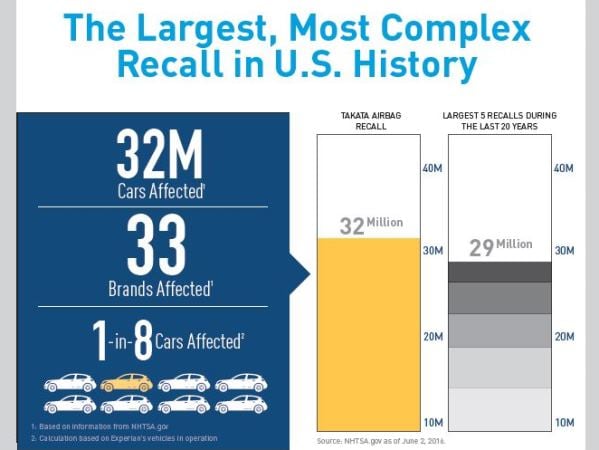
The largest automotive recall ever, involving Takata airbags in 32 million vehicles offered by 33 different automakers, registers with just over half of the respondents in a recent Kelley Blue Book study on the recall and its ranking among the top news stories of the day. Even though more vehicles are impacted by this recall than the five largest previous campaigns combined, only 52 percent of the survey participants were aware of the issue.
In fact, the Takata recall is low when compared to awareness about other news issues including the Zika Virus (84 percent), Hillary Clinton’s email problems (87 percent) and the presidential election (95 percent). The low score highlights how difficult the task is in educating the public and getting them to act to have their affected vehicles fixed.
Ranks low in importance
While 52 percent are aware of the Takata recall, only a quarter of the total respondents said the issue is very or extremely important. Among those who are aware, less than a third expressed that they were very or extremely concerned about the problem. Another 40 percent who were aware have not taken steps to find out or fix their vehicles.
“Consumer opinions on the Takata airbag recall seem to be another unfortunate case of people thinking ‘it won’t happen to me,’ but this is easily the largest, more expensive automotive safety issue in U.S. history,” said Karl Brauer, senior analyst for Kelley Blue Book. “In fact, one in eight vehicles on the road are affected by this massive recall, yet 33 percent of those surveyed don’t know if they are impacted. It is vital that all households look up their vehicle’s status on the NHTSA website www.safercar.gov and check with their manufacturer.”
Among those aware of the recall, Toyota (58 percent), Honda (46 percent) and Nissan (35 percent) were the most cited as vehicles being affected, followed by GM (34 percent), Mitsubishi (29 percent) and Ford (28 percent). Three-quarters of the survey participants said they would not likely purchase a new vehicle from an automaker that may still be using Takata airbags.
What to do
After checking the NHTSA www.safercar.gov website, if your vehicle is included, contact a local dealer to schedule the free repair. Because of the size of the recall, there are not enough parts in the pipeline to fix all the cars immediately, so repairs are being prioritized based on vehicle age, geographic and exposure to hot, humid climates. If the driver is not the original owner, check the vehicle’s history for proper prioritization—especially if it came from a hot, humid climate.
Just last week, NHTSA alerted owners of certain 2001-03 Honda and Acura vehicles to stop driving their cars, citing new data showing the vehicles’ Takata airbag inflators have as much as a 50 percent chance of exploding in a crash. The notice applies to about 313,000 units of the 2001-02 Honda Civic and Accord, the 2002-03 Acura TL, 2002 Honda CR-V and Odyssey, 2003 Acura CL and 2003 Honda Pilot that were recalled from 2008-11 for Takata inflators that have not yet been repaired.







